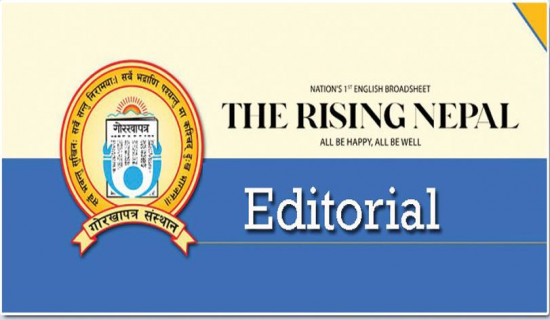- Sunday, 2 November 2025
Boost Budget Spending
Capital spending has been dismal for several years. This fiscal year too only 56 per cent of development budget has been spent as of Tuesday (July 9). This demonstrates the government's efforts and strategy to mobilise the development budget in time have not come to fruition. On the other hand, the tendency to spend the capital budget haphazardly towards the final months/weeks of the fiscal year to avoid its freeze continues to set bad precedent of development works. With just over a week left until the completion of the fiscal year, almost half of the budget remains unused. The then finance minister had announced a substantial budget of Rs. 1751.3 billion, with Rs. 302 billion reserved for capital expenditure. However, only Rs. 157.7 billion has been spent. This recurring inefficiency in capital budget spending is not a new phenomenon. Over the past three years, capital budget mobilisation has consistently fallen below 56 per cent. Last fiscal year, only 55.22 per cent of the allocated Rs. 380.3 billion was spent. The situation was even more depressing during the COVID-19 pandemic in FY 2021/22, with just 46 per cent utilisation, and in FY 2020/21, where 53.6 per cent of the development budget was used.
Despite numerous policies aimed at improving budget mobilisation and expediting development works, successive governments have failed to achieve meaningful progress. The persistent underspending can largely be attributed to fiscal inefficiency and mismanagement, as highlighted by economists. An overhaul of the budget mobilisation system is urgently needed. One of the critical issues is frequent changes in government that lead to reshuffling of the bureaucracy, including project managers, which severely hampers fiscal performance and project development. The planning process is fraught with weaknesses, as projects often get included in the budget without a completed Detailed Project Report (DPR), driven by the priority of the influential people rather than on merit.
Furthermore, delays in budget expenditure by the Ministry of Finance due to poor revenue collection exacerbate the problem. Such delays disrupt the operations of construction entrepreneurs and other vendors, leading to further delays in development projects. This inefficiency and lack of timely financial support erode the confidence of stakeholders in development projects, causing various disturbances and impacting progress. While the government has spent Rs. 240.9 billion on financing, the performance of the development budget has been dismal. Total expenditure from the treasury stands at Rs. 1,322.6 billion, highlighting the uneven execution across different budgetary components.
The ineffective utilisation of the capital budget has negative consequences. Development projects are delayed, infrastructure remains underdeveloped, and economic growth is stunted. This insufficient budget mobilization deprives citizens of the benefits of timely and well-executed development projects. To address these issues, the government must pursue pragmatic initiatives. Stable leadership in key ministries, adherence to rigorous planning processes, and timely budget disbursement are essential steps towards improving capital budget utilisation. Without these reforms, the trend of underperformance will continue, and the nation’s development aspirations will remain unmet. It is imperative that the government demonstrate the political will and administrative capability to mobilise the capital budget effectively and drive meaningful development.

















